dare的两种用法
- 格式:doc
- 大小:27.00 KB
- 文档页数:7
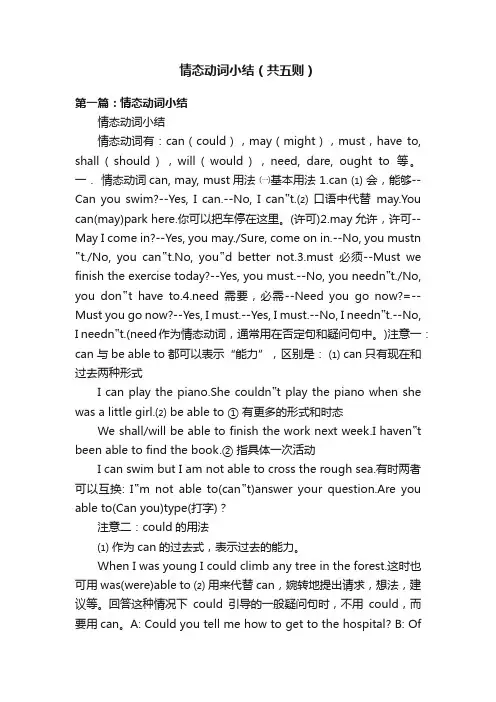
情态动词小结(共五则)第一篇:情态动词小结情态动词小结情态动词有:can(could),may(might),must,have to, shall(should),will(would),need, dare, ought to等。
一.情态动词can, may, must用法㈠基本用法1.can ⑴ 会,能够--Can you swim?--Yes, I can.--No, I can‟t.⑵口语中代替may.You can(may)park here.你可以把车停在这里。
(许可)2.may允许,许可--May I come in?--Yes, you may./Sure, come on in.--No, you mustn ‟t./No, you can‟t.No, you‟d better not.3.must必须--Must we finish the exercise today?--Yes, you must.--No, you needn‟t./No, you don‟t have to.4.need 需要,必需--Need you go now?=--Must you go now?--Yes, I must.--Yes, I must.--No, I needn‟t.--No, I needn‟t.(need作为情态动词,通常用在否定句和疑问句中。
)注意一:can 与be able to 都可以表示“能力”,区别是:⑴ can只有现在和过去两种形式I can play the piano.She couldn‟t play the piano when she was a little girl.⑵ be able to ①有更多的形式和时态We shall/will be able to finish the work next week.I haven‟t been able to find the book.②指具体一次活动I can swim but I am not able to cross the rough sea.有时两者可以互换: I‟m not able to(can‟t)answer your question.Are you able to(Can you)type(打字)?注意二:could的用法⑴ 作为can的过去式,表示过去的能力。
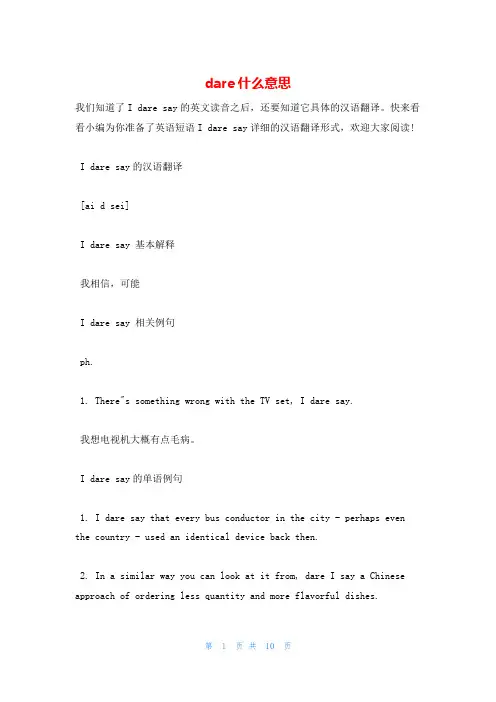
dare什么意思我们知道了I dare say的英文读音之后,还要知道它具体的汉语翻译。
快来看看小编为你准备了英语短语I dare say详细的汉语翻译形式,欢迎大家阅读!I dare say的汉语翻译[ai d sei]I dare say 基本解释我相信,可能I dare say 相关例句ph.1. There"s something wrong with the TV set, I dare say.我想电视机大概有点毛病。
I dare say的单语例句1. I dare say that every bus conductor in the city - perhaps even the country - used an identical device back then.2. In a similar way you can look at it from, dare I say a Chinese approach of ordering less quantity and more flavorful dishes.3. I dare say that people who support increasing the price of electricity must be relatives of those who work in these power plants.4. I do not dare to say what influence I have brought to audiences on the mainland.5. I dare say this principle is hard as steel and relentless as the burning sun.6. " I dare say the president"s very actively engaged in this, " Snow said.7. I dare say thousands of compatriots across the Straits share the same sorrow.8. I dare say, it is the worst day of the year for married man witha mistress.9. I dare not say it"s the best nation, but it"s certainly the easiest to govern.I dare say的双语例句1. I dare say, rough and boorish as the poor fellow is, he thinks a good deal of that.我敢说,尽管这可怜的家伙粗鲁而又蛮横,他对这件事是感激不尽的。
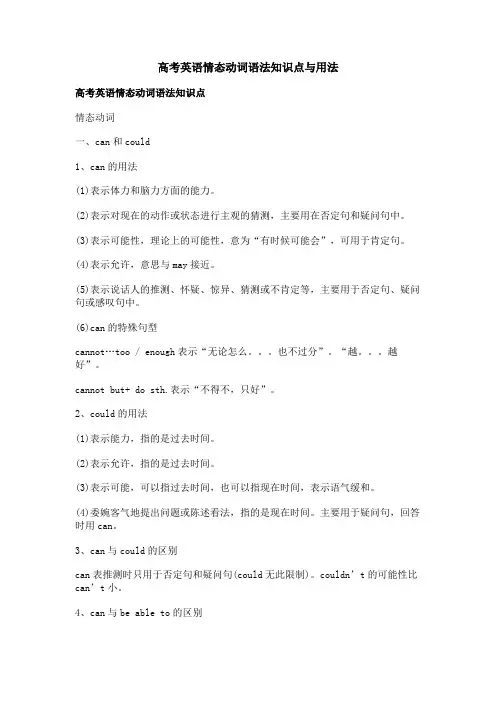
高考英语情态动词语法知识点与用法高考英语情态动词语法知识点情态动词一、can和could1、can的用法(1)表示体力和脑力方面的能力。
(2)表示对现在的动作或状态进行主观的猜测,主要用在否定句和疑问句中。
(3)表示可能性,理论上的可能性,意为“有时候可能会”,可用于肯定句。
(4)表示允许,意思与may接近。
(5)表示说话人的推测、怀疑、惊异、猜测或不肯定等,主要用于否定句、疑问句或感叹句中。
(6)can的特殊句型cannot…too / enough表示“无论怎么。
也不过分”。
“越。
越好”。
cannot but+ do sth.表示“不得不,只好”。
2、could的用法(1)表示能力,指的是过去时间。
(2)表示允许,指的是过去时间。
(3)表示可能,可以指过去时间,也可以指现在时间,表示语气缓和。
(4)委婉客气地提出问题或陈述看法,指的是现在时间。
主要用于疑问句,回答时用can。
3、can与could的区别can表推测时只用于否定句和疑问句(could无此限制)。
couldn’t的可能性比can’t小。
4、can与be able to的区别(1)现在时:无区别,但后者不常用。
(2)完成时;can没有完成时,此时要用have(has,had)been able to。
(3)将来时:can没有将来时,要用will be able to。
(4)过去时:could表示一般能力,was/were able to 表示在具体场合通过努力成功做成某事的能力。
二、may 和might1、may的用法(1)表示询问或说明一件事可不可以做。
(2)表示一件事或许会发生或某种情况可能会存在,通常用在肯定句和否定句中。
注意:表示可能性时,can’t语气强,表示“不可能”,may not语气弱,表示“可能不”。
2、might的用法(1)表示询问或允许,指的是过去时间。
(2)表示可能发生的事,可以指过去时间,也可以指现在时间,语气更加不肯定,可能性比may小一些。
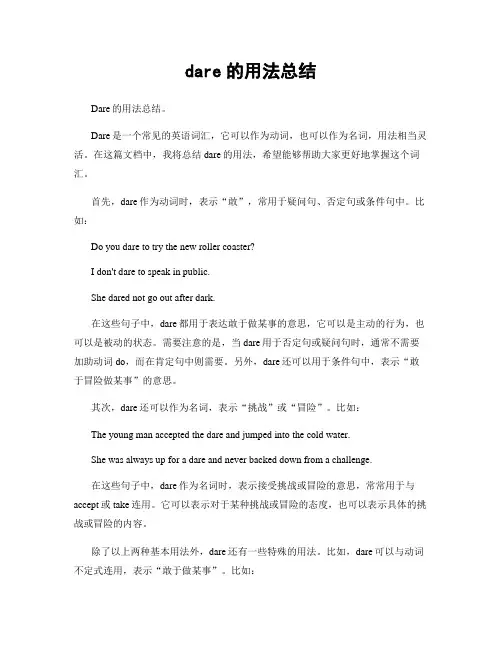
dare的用法总结Dare的用法总结。
Dare是一个常见的英语词汇,它可以作为动词,也可以作为名词,用法相当灵活。
在这篇文档中,我将总结dare的用法,希望能够帮助大家更好地掌握这个词汇。
首先,dare作为动词时,表示“敢”,常用于疑问句、否定句或条件句中。
比如:Do you dare to try the new roller coaster?I don't dare to speak in public.She dared not go out after dark.在这些句子中,dare都用于表达敢于做某事的意思,它可以是主动的行为,也可以是被动的状态。
需要注意的是,当dare用于否定句或疑问句时,通常不需要加助动词do,而在肯定句中则需要。
另外,dare还可以用于条件句中,表示“敢于冒险做某事”的意思。
其次,dare还可以作为名词,表示“挑战”或“冒险”。
比如:The young man accepted the dare and jumped into the cold water.She was always up for a dare and never backed down from a challenge.在这些句子中,dare作为名词时,表示接受挑战或冒险的意思,常常用于与accept或take连用。
它可以表示对于某种挑战或冒险的态度,也可以表示具体的挑战或冒险的内容。
除了以上两种基本用法外,dare还有一些特殊的用法。
比如,dare可以与动词不定式连用,表示“敢于做某事”。
比如:She didn't dare to ask for help.I dare not tell him the truth.在这些句子中,dare与动词不定式连用,表示敢于做某事,意思与作为动词时的用法相似,但更加强调敢于做某事的态度。
此外,dare还可以用于疑问句中,表示“敢不敢”。
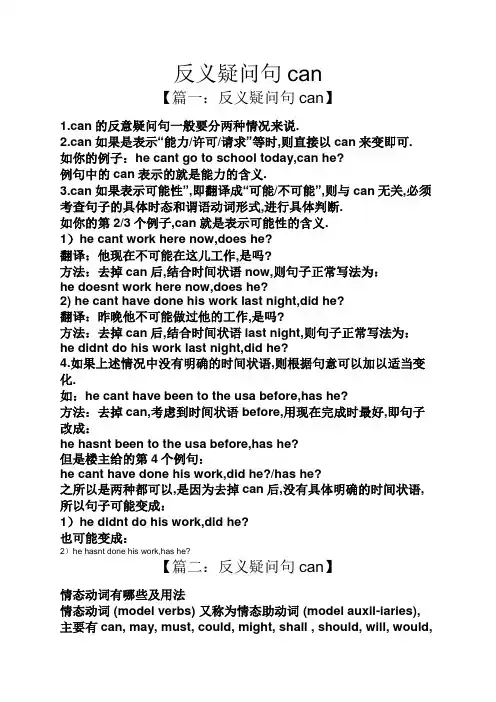
反义疑问句can【篇一:反义疑问句can】1.can的反意疑问句一般要分两种情况来说.2.can如果是表示“能力/许可/请求”等时,则直接以can来变即可.如你的例子:he cant go to school today,can he?例句中的can表示的就是能力的含义.3.can如果表示可能性”,即翻译成“可能/不可能”,则与can无关,必须考查句子的具体时态和谓语动词形式,进行具体判断.如你的第2/3个例子,can就是表示可能性的含义.1)he cant work here now,does he?翻译:他现在不可能在这儿工作,是吗?方法:去掉can后,结合时间状语now,则句子正常写法为:he doesnt work here now,does he?2) he cant have done his work last night,did he?翻译:昨晚他不可能做过他的工作,是吗?方法:去掉can后,结合时间状语last night,则句子正常写法为:he didnt do his work last night,did he?4.如果上述情况中没有明确的时间状语,则根据句意可以加以适当变化.如:he cant have been to the usa before,has he?方法:去掉can,考虑到时间状语before,用现在完成时最好,即句子改成:he hasnt been to the usa before,has he?但是楼主给的第4个例句:he cant have done his work,did he?/has he?之所以是两种都可以,是因为去掉can后,没有具体明确的时间状语,所以句子可能变成:1)he didnt do his work,did he?也可能变成:2)he hasnt done his work,has he?【篇二:反义疑问句can】情态动词有哪些及用法情态动词 (model verbs) 又称为情态助动词 (model auxil-iaries), 主要有can, may, must, could, might, shall , should, will, would,ought to, need, dare等(过去式更委婉哦!)。
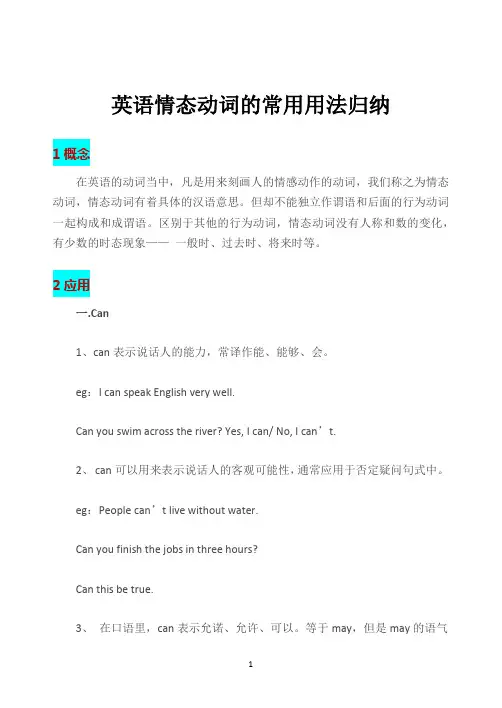
英语情态动词的常用用法归纳1概念在英语的动词当中,凡是用来刻画人的情感动作的动词,我们称之为情态动词,情态动词有着具体的汉语意思。
但却不能独立作谓语和后面的行为动词一起构成和成谓语。
区别于其他的行为动词,情态动词没有人称和数的变化,有少数的时态现象——一般时、过去时、将来时等。
2应用一.Can1、can表示说话人的能力,常译作能、能够、会。
eg:I can speak English very well.Can you swim across the river? Yes, I can/ No, I can’t.2、can可以用来表示说话人的客观可能性,通常应用于否定疑问句式中。
eg:People can’t live without water.Can you finish the jobs in three hours?Can this be true.3、在口语里,can表示允诺、允许、可以。
等于may,但是may的语气重于can。
eg:Can I come in? = May I come in?Can I use your bike? = May I use your bike ?*表示允许可以may mightcould can4、在“过去时”的语境里,通常用could 表示它的过去式,用be able to 短语(was/were)而could通常用来在一般现在时的语境里表示委婉语气eg:Could(can)you show me the way to the supermarket?5、can表示猜测(1)对现在状态的一种猜测,只能用在否定疑问句中。
eg:Zhang can’t be ill really?This can’t be done by him.(2)对现在动作的猜测eg: The boy can’t be telling lies.Mary works so hard, now, she can’t be sleeping.(3)对过去动作的一种猜测eg:He can’t have gone to the bookshop yesterday.Mother couldn’t have said it.6、can(could)惯用法(1)can’t wait to do 迫不及待做…….eg: Children can’t wait to eat apples in the basket.(2)can’t help doing 情不自禁做某事。
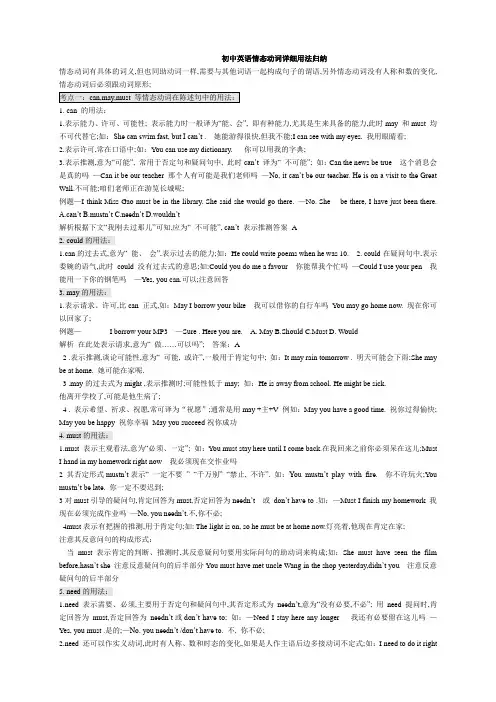
初中英语情态动词详细用法归纳情态动词有具体的词义,但也同助动词一样,需要与其他词语一起构成句子的谓语,另外情态动词没有人称和数的变化,情态动词后必须跟动词原形;1. can 的用法:1.表示能力、许可、可能性; 表示能力时一般译为“能、会”, 即有种能力,尤其是生来具备的能力,此时may 和must 均不可代替它;如:She can swim fast, but I can’t . 她能游得很快,但我不能;I can see with my eyes. 我用眼睛看;2.表示许可,常在口语中;如:You can use my dictionary. 你可以用我的字典;3.表示推测,意为“可能”, 常用于否定句和疑问句中, 此时can’t 译为“ 不可能”; 如:Can the news be true 这个消息会是真的吗—Can it be our teacher 那个人有可能是我们老师吗—No, it can’t be our teacher. He is on a visit to the Great Wall.不可能;咱们老师正在游览长城呢;例题—I think Miss Gao must be in the library. She said she would go there. —No. She __be there, I have just been there.A.can’tB.mustn’tC.needn’tD.wouldn’t解析根据下文“我刚去过那儿”可知,应为“ 不可能”, can’t 表示推测答案 A2. could的用法:1.can的过去式,意为“ 能、会”,表示过去的能力;如:He could write poems when he was 10.2. could在疑问句中,表示委婉的语气,此时could 没有过去式的意思;如:Could you do me a favour 你能帮我个忙吗—Could I use your pen 我能用一下你的钢笔吗—Yes, you can.可以;注意回答3. may的用法:1.表示请求、许可,比can 正式,如:May I borrow your bike 我可以借你的自行车吗You may go home now. 现在你可以回家了;例题—_______ I borrow your MP3 —Sure . Here you are. A. May B.Should C.Must D. Would解析在此处表示请求,意为“ 做……可以吗”;答案:A2 .表示推测,谈论可能性,意为“ 可能, 或许”,一般用于肯定句中; 如:It may rain tomorrow . 明天可能会下雨;She may be at home. 她可能在家呢.3 .may的过去式为might ,表示推测时;可能性低于may; 如:He is away from school. He might be sick.他离开学校了,可能是他生病了;4 . 表示希望、祈求、祝愿,常可译为“祝愿”;通常是用may +主+V 例如:May you have a good time. 祝你过得愉快; May you be happy 祝你幸福May you succeed祝你成功4. must的用法:1.must 表示主观看法,意为“必须、一定”; 如:You must stay here until I come back.在我回来之前你必须呆在这儿;MustI hand in my homework right now 我必须现在交作业吗2 其否定形式mustn’t表示“ 一定不要” “千万别” “禁止, 不许”. 如:You mustn’t play with fire. 你不许玩火;You mustn’t be late. 你一定不要迟到;3对must引导的疑问句,肯定回答为must,否定回答为needn’t 或don’t have to .如:—Must I finish my homework 我现在必须完成作业吗—No, you needn’t.不,你不必;4must表示有把握的推测,用于肯定句;如: The light is on, so he must be at home now.灯亮着,他现在肯定在家;注意其反意问句的构成形式:当must表示肯定的判断、推测时,其反意疑问句要用实际问句的助动词来构成;如:She must have seen the film before,hasn’t she 注意反意疑问句的后半部分You must have met uncle Wang in the shop yesterday,didn’t you 注意反意疑问句的后半部分5. need的用法:1.need 表示需要、必须,主要用于否定句和疑问句中,其否定形式为needn’t,意为“没有必要,不必”; 用need 提问时,肯定回答为must,否定回答为needn’t或don’t have to; 如:—Need I stay here any longer 我还有必要留在这儿吗—Yes, you must .是的;—No. you needn’t /don’t have to. 不, 你不必;2.need 还可以作实义动词,此时有人称、数和时态的变化,如果是人作主语后边多接动词不定式;如:I need to do it rightnow. 我需要马上做这件事;He needs to learn more about the girl.他需要多了解那个女孩;如果是物作主语,一般用need doing 与need to be done这种情况下应注意两点:①.主动形式的动名词doing具有被动的含义;②.该动名词可以改为其动词不定式的被动形式而句子的意义不变;例如:. The door needs painting. = The door needs to be painted. 那扇门需要油漆一下;Your car needs mending. = Your car needs to be repaired. 你的车需要维修了;6. dare 的用法:dare意为“敢、敢于”, 用法近似于need,有两种词性:1dare 作为情态动词,多用于否定句、疑问句或条件句中,无第三人称单数形式,只有一般现在时和一般过去时;如:Dare he tell them what he knows 他敢告诉他们所知道的情况吗I daren’t ask her – will you do it for me 我可不敢问她,你能帮我问问吗2dare 作为实义动词,此时有人称、数及时态的变化;如:He doesn’t dare to break his promise.他不敢食言;注意:在口语中,dare 的各种形式常与不带to 的不定式连用;如:Do you dare tell her what I said你敢告诉她我说的话吗I didn’t dare look at him.我不敢看他;7. shall 的用法:shall表示征求对方意见多用于第一、三人称,如:Shall we go out for a walk 我们出去散步好吗在英语中,我们可以用其他多种方式提出我们的建议或征求对方意见;1.用“Let's do...”来提出建议;如:Let's go for a walk after supper.2.用“What/How about... ”来提出建议;about后接名词或动词ing形式;如:What about/How about a drink What about/How about taking Tom with us3.用“Why not... ”来提出建议,表示“何不……”not面后接动词原形;“Why not... ”实际上是“Why don't you/we... ”的简略形式;如:Why not meet at the school gate at eight Why don't we stay here another day4.用“Would you like... ”来提出建议,意思是“你想要……吗”Would you like后可接名词或不定式;如:Would you likea cup of tea Would you like to go and see her因此,如果我们说:“去游泳好吗”英语中可有这样几种表达法:Shall we go for a swim Let's go for a swim,shall we What about/How about going swimming Why not go for a swim Would you like to go for a swim What do you think of going for a swim8. should的用法:1.should 意为“应该” ,可表示劝告、建议、义务、责任等; 如:We should protect the environment.2Should have done 表示对过去动作的责备、批评;如:You should have finished your homework.你应该已经完成作业了;事实上你没有完成;9. will 的用法:will表示意愿、意志、打算,可用于多种人称;如:I will help you if I’m free this afternoon.注意:1、will在there be句型中的形式及其句式变换;由于“一般将来时”的结构可以用“will+动词原形”来表示,所以there be句型的一般将来时的形式就是there will be;一定不能说there will have例如:There are many students in our school. →There will be many students in our school. There will be a sports meeting next week. 一定不能说:There will have a sports meeting next week.2、will 与be going to do sth区别:①. be going to 表示近期、眼下就要发生的事情,will 表示的将来时间则较远一些,如:He is going to write a letter tonight. He will write a book one day.②. be going to 表示根据主观判断将来肯定发生的事情,will表示客观上将来势必发生的事情;He is seriously ill. He is going to die. He will be twenty years old.③. be going to 含有“计划,准备”的意思,而will 则没有这个意思,如:She is going to lend us her book.He will be here in half an hour.④.在有条件从句的主句中,一般不用be going to, 而多用will, If any beasts comes at you, I'll stay with you and help you10. had better 的用法:had better 意为“最好”,没有人称的变化,后面接不带to 的不定式,其否定形式为:had better not;如:We had better go now. 我们最好现在就走;You had better not give the book to him.你最好不要把这本书给他;1.对may 引出的问句,可以有下列回答方式:Yes,you may. Yes, of course.Yes, certainly.Sure .No, you mustn’t. No, you can’t.2.对must引出的疑问句,回答方式为:Yes, …must. No,… needn’t/ don’t have to.3.could在疑问句中,表示委婉的语气,此时could 没有过去式的意思;如:Could you do me a favour 你能帮我个忙吗—Could I use your pen 我能用一下你的钢笔吗—Yes, you can.可以;注意回答4. shall引出的疑问句用于第一人称, 表示征求对方意见或客气的请求;其回答方式有以下几种:Yes, please.All right.No, thank you.5.would you…的回答方式有以下几种:Yes, I will. No, I won’t.Sure . I’m sorry , I can’t.All right/ OK/ With pleasure. Certainly. No, thank you .Yes, please.例题—Would you do me a favour and pass on my thanks to Lily —________.A.That’s rightB.With pleasureC.It doesn’t matterD.No trouble解析A. 意为“对了” ,B.意为“ 乐意效劳”, C. 意为“ 没关系” D.意为“不费事”;答案:B1.1.can’t可译为“不会”, 如:I can’t play basketball. 我不会打篮球;2当句子表推测时,用can’t 表达不可能, 如:He can’t be ill. He is playing chess with Tom. 他不可能病了,他正和Tom 下棋呢;3can’t 还可用来回答“ May I … ” 这样的问句; 如:May I come in 我可以进来吗No, you mustn’t. / can’t. 不,你不能;4can’t 还可用于固定习语中;can’t help doing 禁不住,…情不自禁…can’t wait to do sth 迫不及待…如:She can’t help crying. 她不禁大哭起来;The children can’t wait to open the box. 孩子们迫不及待地想打开盒子;2. may的否定式为may not,译成“ 可能不”,如:He may not be at home. 他也许不在家;3.1mustn’t 表示不许,不可;如:He mustn’t leave his room. 他不许离开他的房间;You mustn’t ta lk in class. 你们不可以在课上说话;2 mustn’t 也可用于以may 表示要求时的否定回答中;如:—May I stand here 我可以站在这里吗—No, you mustn’t can’t. 不,不行;4.1needn’t 意为“ 不必”;如:You needn’t meet him unless you’d like to.你不需要见他,除非你愿意;2needn’t + have+ 动词的过去分词,表不需要完成但已完成的动作,暗含时间或精力上的浪费;如:You ne edn’t have bought it. 你没必要买它但你却买了;5. shouldn’t 表示不应该;如:You shouldn’t feel so unhappy over such little things. 对于这种小事,你不应该感到这么不高兴;考点四:情态动词的被动语态含有情态动词的被动语态的结构为:情态动词+ be + done 动词的过去分词;做题时要兼顾情态动词和被动语态这两个方面;如:You needn’t get up so early every day.你不必每天都起这么早;She shouldn’t speak to her mother in that way.她不应该用那种方式和妈妈说话;More and more trees must be planted in China.在中国必须种植更多的树木;Many of the stars can not be seen because they are far away from us.很多星星我们都看不到,因为它们离我们太远了;一、“情态动词+动词原形”表示对现在的推测;1、can表示推测时一般用于否定句或疑问句;如:That man can't be her husbandshe is still single.Who is knocking at the door Can it be the postman2、must表示肯定的推测,一般用于肯定句中;如:He must be in his office now.Mr Li must be working now, for the lights in his office are still on.3、might 表示推测时不一定是may的过去时,只是表示其可能性较小;如:The man may be the headmaster.—Where is Mr Li —He might be working in his office. —May Mr Li come —He might not come here.4、Could表示推测时,语气can比要弱,说话者留有余地;如:—Could it be an animal —It could not be, because it is not moving.5、Should表示推测的可能性比较大,仅比must的可能性小一点;如:It is already 10 o’clock now they should be there.二、情态动词表示对过去可能发生的动作或存在过的动作的推测性用法;1、“must +have done/been------”表示“过去一定发生过某事或存在过某种状态”,不用于“musn’t+have-----”形式;如:She must have seen the film before,hasn’t she 注意反意疑问句的后半部分You must have met uncle Wang in the shop yesterday,didn’t you 注意反意疑问句的后半部分2、“should +have done /been-------”表示“本应当做某事,而实际上并没有做”;“shouldn’t+完成式”表示“本来不应当做,而实际上却做了”;以上结构常带有说话者的责备的感情色彩;如:You should have finished your homework earlier but in fact you did not finish it on time.You shouldn’t have gone to bed when you woke up at five but in fact you went to bed again then.3、“needn’t+完成式”表示“本来没有必要做某事,而实际上却做了”;如:There was plenty of time. She needn't have hurried .4、“can’t /couldn’t+have done /been-------”表示“过去不可能发生了某事或存在过某种状态”;如:I saw him just now. He can’t have gone to Japan.She said the man couldn’t have stolen her car.5、“could+have done/been-------”表示“过去本来能够,可以做某事或成为某种状态,而实际上没有”,说话者有些遗憾;“could sb. have done /been------- ”是它的问句形式;如:You could have stayed with the Smiths while you were in New York but in fact you stayed in a nearby hotel . Could Mr Li have helped this girl student6、“may/might+完成式”表示“过去可能,本来可以于某事而实际上没有干”,might的可能性较小,语气较弱;如:He may have finished reading the book. She might have given you some help,however bus she was.易混点一: can和be able to:两者表示能力时用法相同,但can只有原形“can”和过去式“could”两种形式,在其他时态中要用be able to 来表示;另外be able to 常常指经过努力,花费了时间和劳力之后才能做到某事;如:Jim can’t speak English.吉姆不会说英语;He could speak English at 5. 他五岁时就会说英语;We’ll be able to see him next week.下星期我们将会见到他;He has been able to drive. 他已经会开车了;I’m sure you’ll be able to finish it quickly.我相信你能迅速地完成;We were able to reach the top of the mountain at noon.我们能在中午到达山顶;易混点二:can和may1. can 和may 均可用来征求意见或许可,意为“可以”, 一般可互换使用;如:Can/ May I help you2. can 和may 表示可能性时的区别:1在肯定句中用might,may,must,不用can2在疑问句中表示推测用can,不用might,may,must3 在否定句中用can’t不可能, 不用may, must; 如:She may be in the classroom . 她可能在教室里;Where can they be now 他们现在可能在哪儿That can’t be true. 那不可能是真的;易混点三: may be 和maybe用法区别常用位置may be may为情态动词, be为动词原形句中,作谓语maybe 副词,大概、也许,相当于perhaps 句首,作状语例如:He may be wrong , but I’m not sure. 也许他错了,但我也不确定;易混点四:can’t 和mustn’t1. can’t 根据其基本用法可译为:1不会;如:I can’t speak English . 我不会说英语;2不能;如:We can’t do it now because it’s too dark.天太黑了,我们现在干不了;3否定句中表示推测;“不可能”,如:The man can’t be our teacher because he is much younger than our teacher.. 那个人不可能是咱们老师,他年轻得多;2. mustn’t 意为“ 禁止、不许”, 用来表达命令,表示强烈的语气; 如:You mustn’t play football in the street.It’s too dangerous.你不可以在街上踢足球,太危险了;易混点五:must 和have to1.must 侧重于个人意志和主观上的必要;have to 侧重于客观上的必要,可用于现在时、过去时和将来时;如:I know I must study hard.我知道我必须努力学习;My brother was very ill, so I had to call the doctor in the mid-night.我弟弟病得厉害, 我只得半夜里把医生请来;I haven’t got any money with me, so I’ll have to borrow some from my friend.我身上没带钱,只好向朋友借点了;He said they must work hard.他说他们必须努力工作;2. have to可以用于多种时态;而must只用于一般现在或将来;如:The composition is due to hand in this morning, so I had to finish it last night. 作文今天早晨到期,因此我不得不昨天晚上完成;易混点六: used to do / be used to doing / be used to do…/ be used for doing sthused to do 表示过去常常发生的动作, 强调过去,只用于过去,注意用to do,不用doing形式;而be used to doing 意为“习惯做…”, be 可有各种时态;be used to do 意为“……被使用去做……,”为被动语态形式;be used for doing sth“用作……”如:My father used to eating meat.我父亲过去起床晚,但现在不得不早起了;She is used to eating meat.她习惯吃肉;He wasn’t used to eating in a restaurant.他不习惯在饭店吃饭;A knife can be used for cutting things.刀可以用来割东西/ A knife can be used to cut things.刀可以用来割东西2013河南26. —Dad, must we wait until the light becomes green—Yes, I'm afraid we______ .That's the traffic rule.A. canB. mayC. have toD. need答案C解析考查情态动词的用法;由上文句意“我们必须等到灯变绿吗”和下文句意“那是交通规则”可知,我们必须要等到灯变为绿色;have to“不得不”,强调客观上的要求;2013河北34._ I see your ID card, sir We have to check your information.A. MayB. MustC. ShouldD. Need答案A解析考查情态动词的运用;向别人请求许可可用can,may;根据句意,“我可以看一下你的身份证件吗我们不得不核实你的信息;”可知此处表示请求许可,故答案应选A;2013 甘肃白银37. Finish your homework first, then you’ll _______ watch TV for an ho ur.A. canB. be able toC. able D could答案B 考查助动词用法; will是助动词,其后应该用动词的原型,故选B;2013广东梅州35.—Amy, I hear you’ve got many foreign coins. ______ I have a look —Of course, I’ll fetch them for you. A. May B. Must C. Should D. Need答案A解析考查情态动词的用法;句意:——艾米,我听说你有很多外国硬币;我可以看一下吗——当然了;我拿给你看;May I… 用于向对方提出建议或请求,意为“我可以……吗”;故选A;2013天津37.— Where are you going this month — We______ go to Xiamen, but we're not sure.A. needn’tB. mustC. mightD. mustn't答案C解析考查情态动词表推测;A“不必”表建议;B“一定”表猜测的可能性很大;C“可能,也许”表不是很肯定的猜测;D“不允许”表命令;句意:——这个月你们将去哪——我们或许去厦门,但还不确定;2013山东威海33. —May I go out for a while, Mom —No, you . You have to finish your homework first.A. shouldn'tB. needn'tC. mustn'tD. won't答案B解析考查情态动词的用法;句意:妈妈,我可以出去一会吗不,你不能; 你必须首先完成你的作业;shouldn’t不应该;needn’t不必要;mustn’t一定不能,表示明令禁止;won’t将不能;根据答语,你必须首先完成你的作业,可知不同意出去玩;故选B;2013山东莱芜28. Students in our school ________ know shouting is not allowed in the library.A. canB. mayC. mustD. need答案C解析考查情态动词用法辨析;can可以;may也许;must必须;need需要;根据句意:学生在我们学校必须知道不允许在图书馆大喊大叫,所以选择答案C;2013湖南长沙25. —_______ I have lunch now, Mom —No. You must wash your hands first.A. WouldB. MayC. Ought to答案B解析考查情态动词用法;Would和ought to引导的问句,均不能用must回答;2013福建泉州36.— Have you decided where to go for your summer vacation—Not yet. We _______go to Qingdao . It's a good place for vacation.A. mayB. needC. must答案A解析本题考查情态动词;句意:——你已经决定到哪里过暑假了吗——还没有呢,我们也许去青岛;那是个度假的好地方;情态动词表示推测时,may表“可能”,must表“一定”,can’t表“不可能”;2013江苏徐州12. —Can I borrow your ruler,please—Yes,you . But you must return it to me before lunchtime.A. haveB. canC. mustD. used to答案B解析考查情态动词;答句意为“是的,你可以,但你必须在午饭之前归还给我”;2013江苏淮安9.—Can I park my car in front of the building —No, you ________.A. won'tB. can'tC. needn'tD. couldn't解析考查情态动词的用法;问句是由can引导的一般疑问句, 因此用can't作否定回答, 所以选择B;2013江苏常州4.—Shall I take my swimming suit—No, you . We will just go hiking in the mountain.A. mustn’tB. couldn’tC. needn’tD. can’t解析本题考查情态动词的用法;由回答后半句“我们只是去远足”可知不需要带游泳衣;故选C;2013浙江舟山、嘉兴23. Drivers ________ wear seat belts while their cars are running on the road.A. needB. canC. mustD. may解析考查情态动词的用法;句意为“司机必须系安全带当车在路上行驶的时候;”must的意思是“必须”,符合句意;故选C; 2013四川遂宁34.―Must I return the book this week ― No, you. You can it for 20 days.A. mustn’t, keepB. needn’t, borrowC. needn’t, keep解析考查情态动词及动词的含义; 句意为:—我必须这周还这本书吗—不,你不需要;你可以借20天;由must提问,否定回答是要用needn’t;borrow为非延续性的动词,不可与表示一段时间的词连用;故选C;2013四川南充32. — Excuse me, whose book is this —It ________ be John’s. It has his name on it.A. mustB. needC. can’t解析考查情态动词用法;题意:——对不起,这是谁的书——它一定是约翰的,它上面有他的名字;must “一定,准是”表猜测;need “需要”;can’t “不能,不可能”;根据题意选A;2013四川广安34. —____I swim here —No, you _____. Look at the sign “No swimming”.A. Must:can’tB. Can; don’tC. Can; mustn’t解析本题考查情态动词的用法;must引导的问句,否定回答用needn’t或don’t have to,排除A项;can 引导的问句,否定回答用can’t,排除B项;由句意“我可以在这里游泳吗”“不,千万不要;看一下那个标牌‘禁止游泳’;”2013 上海40. —Must I go to medical school and be a doctor like you, dad—No, you _______,son. You’re free to make your own decision.A. can’tB. mustn’tC. shouldn’tD. needn’t解析考查情态动词的辨析句意:爸爸,我必须去医学院,成为像你一样的医生吗你不必,儿子;你可以自己做决定;用must提问的句子,其否定回答用needn’t或don’t have to;2013 上海35. A lot of foreigners ______ familiar with the famous places if interest in China.A. amB. is C .are D. be答案C考查动词be的用法主语foreigners是复数,因此用are;2013湖南益阳24. The man ______be my English teacher. He has gone to Canada.A. mightB. mustC. c an’t解析考查情态动词的用法;must表肯定的推测,意为“一定”,可能性较大,might表示肯定推测,“可能”,可能小较小,can’t表示否定推测,意为“不可能”;根据句意:那个人不可能是我的英语老师,他去加拿大了;故选C;2013山西21. A country has dreams. We teenagers ________ also have dreams. With dreams and hard work, anything amazing can be created.A. mayB. mustC. should解析考查情态动词;一个国家有梦想,我们青少年也有梦想,有梦想和努力工作,任何奇迹都能创造;may “可以”;must “必须”;should “应该”;根据题意选C;2013山东济宁19. According to the new traffic law, everyone in a car _______wear the seat belt.A. canB. mayC. mustD. will解析考查情态动词的用法;can“能”;may“可以”;m ust“必须”;will“将要”;由句意“根据新交规,乘车的每个人必须戴安全带”;只有C符合题意;2013江西30. There's only one day to go. You _____finish your schoolwork by tomorrow.A. canB. willC. mustD. may解析考查情态动词的用法;句意:只剩一天时间了,你必须到明天为止完成学校作业;四个选项中只有must表达强烈要求“必须”,因此答案选C;2013 湖北黄冈37. —Who’s the man over there Is it Mr. Black —It ______ be him. He’s much taller.A. may notB. can’tC. will notD. mustn’t解析考查情态动用法; 句意:那边那个人是谁是布莱克先生吗一定不是他,他高多了;情态动词表推测:“一定” 用must,“可能”用might、may、could;“一定不”用can’t;故选B;2013山东潍坊21. You mustn’t go off on your own, because you _______get lost in the mountains.A. shouldB. mustC. needD. might解析考查情态动词的用法;根据句意“你不许一个人去,因为你可能在大山里迷路”, might 意为“可能”,表猜测;故选D; 2013江苏盐城4.—Are you in a burry —NO, I’ve got plenty of time I wait.A. canB. can’tC. mustD. mustn’t解析情态动词的用法;can表示可能性;must表示肯定;根据句意:你忙碌吗我有大量时间,可以等;2013江苏苏州11. ______ a beautiful car I’v e never seen it before.A. WhatB. WhichC. HowD. Whether解析考查感叹句;What+a\ an形容词+名词+主语+谓语;How +形容词+主语+谓语a beautiful car为可数名词,前用what,要加a, 故选A;2013江苏苏州10. If you ______ go, at least wait until the rain stops.A. canB. mayC. mustD. will解析考查情态动词;根据句意“如果你必须得走,至少要等到雨停的”,只有C符合题意;2013山东济南40. —_________ I help you, sir —Yes. I want a T-shirt.A. CanB. ShouldC. MustD. Would解析考查情态动词辨析;根据答语“Yes. I want a T-shirt.”判断问句是售货员常用的问候语“Can I help you ”;所以答案选A;2013湖南株洲24.-Oh, it's raining hard. -Be careful The road be wet.A. couldB. mustC. might解析考查情态动词的用法;Could和might表示没有把握的推测,must表示有把握的推测;根据上句句意“正下大雨;”,可推测“路肯定很湿”;故选B;2013安徽32. You ____________ drive your car so fast. It’s very dangerous.A. wouldn’tB. shouldn’tC. couldn’tD. mightn’t解析考查情态动词的用法;wouldn’t意为“将不,不会”;shouldn’t意为“不应该” couldn’t意为“不能;可能不”;mightn’t 意为“可能不”;句意为:你不应该开车这么快,非常危险;故选B;2013湖北随州22. —Hello, Lisa. What's the matter —I ______find my mobile phone. _______ you seen itA.couldn't; DidB. can't; HaveC. need ; HadD. must; Are解析考查情态动词以及助动词的用法;我找不到我的手机,用can't;你见过它么现在完成时,havehas+动词的过去分词; 所以选择答案B;2013黑龙江绥化15. — Whose T-shirt is this —It ________ be John’s. It’s ________ small for him.A. can’t; much tooB. can’t; too muchC. mustn’t; too much解析考查情态动词和固定短语辨析;句意:——这是谁的T恤——不可能是约翰的;对他来说太小了;can't表示推测时,表示不可能;mustn’t 不可以,表禁止;too much太多;much too = very“很,太”的意思修饰形容词或者副词;根据句意,所以选择答案A;2013黑龙江齐齐哈尔8. -Must I return before dinner, Mum -No, you . You can come back later.A. mustn’tB. needn’tC. may not解析考查情态动词的用法;must的一般疑问句,否定回答要用needn’t,故选B项;2013广西贺州39. The woman who is talking with Mr. Brown ______ be Miss Li. She has gone to England.A. can’tB. mustC. mayD. mustn’t解析考查情态动词的辨析;句意:正在和布朗先生一起交谈的那位女士_______是李小姐;她去英国了;can’t不可能,表示否定推测;must一定,肯定推测;may可能,一般推测;mustn’t,绝不,绝对禁止;根据后句的意思可知,空格表示否定推测,故选A;2013江苏连云港7. From March 23rd 2013, anyone under the age of 14 ________ go into Disney's US parks alone.A. couldn'tB. mustn'tC. needn'tD. mightn't解析考查情态动词的用法辨析;couldn’t“不能”,needn’t“没必要”,mustn’t “禁止”,mightn’t“不可以”; 根据句意:“3月23日起,美国迪斯尼乐园禁止14岁以下的儿童独自进入;”,所以选择B;2013四川宜宾34.—Li Lei, hurry up The bus is coming.—Oh, no. We ______ cross the street until the traffic lights turn green.A. mustn’tB. may notC. needn’tD. have to解析考查情态动词的用法;由常识可知,红灯亮时我们不准越过这条街道;mustn’t“不准”符合句意;2013安徽32. You ____________ drive your car so fast. It’s very dangerous.A. wouldn’tB. shouldn’tC. couldn’tD. mightn’t解析考查情态动词的用法;wouldn’t意为“将不,不会”;shouldn’t意为“不应该” couldn’t意为“不能;可能不”;mightn’t 意为“可能不”;句意为:你不应该开车这么快,非常危险;故选B;2013山东泰安28. —May I smoke here —No, you _______. This is a no-smoking room.A. needn’tB. mustn’tC. couldn’tD. wouldn’t解析考查情态动词否定形式的词义辨析;may引导的一般疑问句的否定回答是mustn’t;2013山东青岛7. Excuse me, sir. You ______ open the door before the train stops.A. mustn'tB. needn’tC. may notD. don’t have to解析考查情态动词的用法;mustn't“千万别、一定不”,needn’t “不需要” ,may not“不可能”, don’t have to“不需要”,句意:火车停下来前,你千万不能开门;所以选择答案A;2013湖北武汉34. —Honey, stay home before I return. —I ________, mum.A. mustB. canC. willD. should解析选C;考查动词的时态;根据句意“——Honey,在我回来之前你要待在家里;——我会按照你的吩咐去做的,妈妈;”可以判断应该用一般将来时;所以选择答案C;2013甘肃兰州36. — Look at the boy playing basketball on the ground. Is it George— It ______ be him. He told me he woul d play basketball after class, but he’s not sure.A. mustn’tB. mustC. can’tD. may解析考查情态动词表推测;上句句意:看正在操场上打篮球的那个男孩,他是George 下句后一分句意思:他告诉我他下课后会去打篮球,但他不确定;由此推断George可能去打篮球;A不允许;B一定,表猜测的可能性很大;C不可能,表示否定猜测;D可能,也许;故选D;2013广东广州20.—Must I finish my homework now —No, you ______. You can go home now.A. needn’tB. mustn’tC. shouldn’tD. can’t解析考查情态动词;以Must I… 开头的一般疑问句,其否定回答用No, you needn’t.;故选A;2013广东37. —Someone is knocking at the door. Is it Ann—It ______be her. She is giving a performance at the theater now.A. mayB. mustC. can’tD. mustn’t解析考查情态动词表示推测的用法;由答语她现在在剧院进行表演,说明敲门的一定不是她,may be“可能是”把握性不大的推测,must be“一定是”肯定推测, can’t be“不可能是”用于有把握的否定推测;mustn’t表示“千万别、一定不”;所以选。
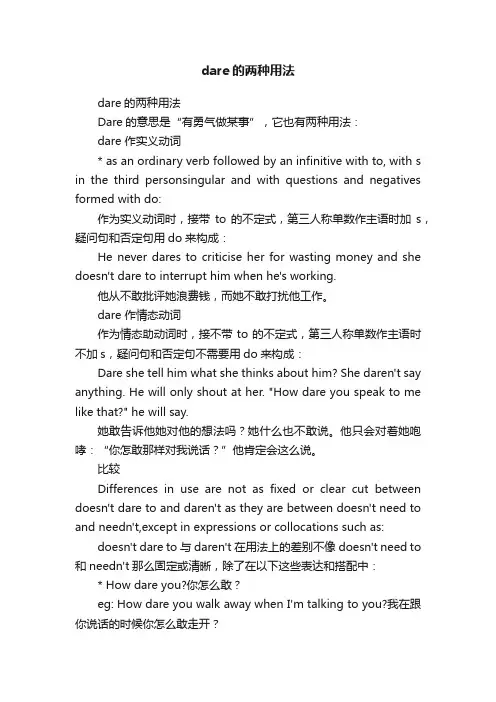
dare的两种用法dare的两种用法Dare的意思是“有勇气做某事”,它也有两种用法:dare 作实义动词* as an ordinary verb followed by an infinitive with to, with s in the third personsingular and with questions and negatives formed with do:作为实义动词时,接带to的不定式,第三人称单数作主语时加s,疑问句和否定句用do来构成:He never dares to criticise her for wasting money and she doesn't dare to interrupt him when he's working.他从不敢批评她浪费钱,而她不敢打扰他工作。
dare 作情态动词作为情态助动词时,接不带to的不定式,第三人称单数作主语时不加s,疑问句和否定句不需要用do来构成:Dare she tell him what she thinks about him? She daren't say anything. He will only shout at her. "How dare you speak to me like that?" he will say.她敢告诉他她对他的想法吗?她什么也不敢说。
他只会对着她咆哮:“你怎敢那样对我说话?”他肯定会这么说。
比较Differences in use are not as fixed or clear cut between doesn't dare to and daren't as they are between doesn't need to and needn't,except in expressions or collocations such as: doesn't dare to与daren't在用法上的差别不像doesn't need to 和needn't那么固定或清晰,除了在以下这些表达和搭配中:* How dare you?你怎么敢?eg: How dare you walk away when I'm talking to you?我在跟你说话的时候你怎么敢走开?* Idare you to…我谅你不敢……I dare you to go up to him and ask him for a date.我谅你也不敢走到他面前请他跟你约会。
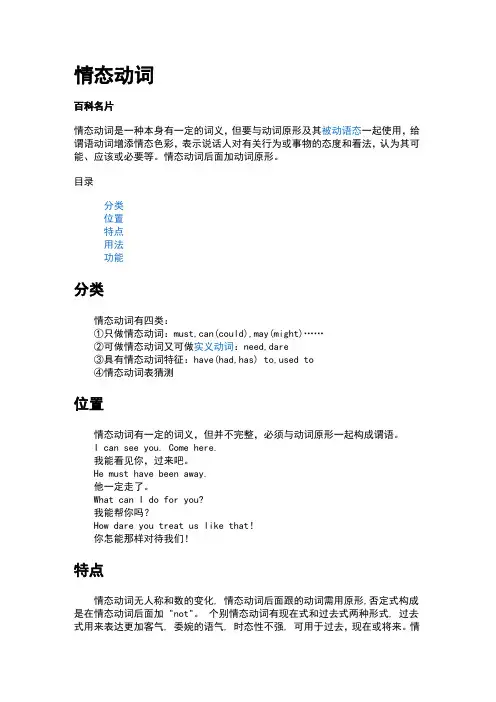
情态动词百科名片情态动词是一种本身有一定的词义,但要与动词原形及其被动语态一起使用,给谓语动词增添情态色彩,表示说话人对有关行为或事物的态度和看法,认为其可能、应该或必要等。
情态动词后面加动词原形。
目录分类位置特点用法功能分类情态动词有四类:①只做情态动词:must,can(could),may(might)……②可做情态动词又可做实义动词:need,dare③具有情态动词特征:have(had,has) to,used to④情态动词表猜测位置情态动词有一定的词义,但并不完整,必须与动词原形一起构成谓语。
I can see you. Come here.我能看见你,过来吧。
He must have been away.他一定走了。
What can I do for you?我能帮你吗?How dare you treat us like that!你怎能那样对待我们!特点情态动词无人称和数的变化, 情态动词后面跟的动词需用原形,否定式构成是在情态动词后面加 "not"。
个别情态动词有现在式和过去式两种形式, 过去式用来表达更加客气, 委婉的语气, 时态性不强, 可用于过去,现在或将来。
情态动词属非及物动词,故没有被动语态。
He could be here soon.他很快就来。
We can't carry the heavy box.我们搬不动那箱子。
I'm sorry I can't help you.对不起,我帮不上你。
基本助动词与情态助动词最主要的区别之一是:基本助动词本身没有词义,而情态助动词则有自己的词义,能表示说话人对有关动作或状态的看法,或表示主观设想:What have you been doing since? (构成完成进行体,本身无词义)I am afraid I must be going. (一定要)You may have read some account of the matter. (或许已经)除此之外,情态助动词还有如下词法和句法特征:1)除ought和used以外,其他情态动词后面只能接不带to的不定式。
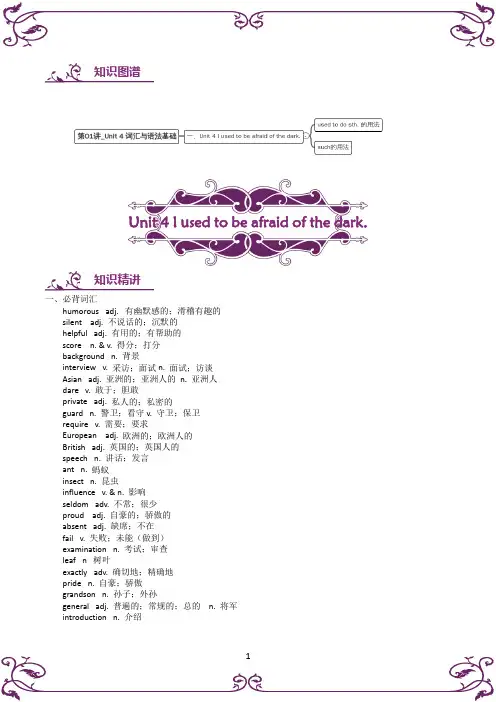
知识图谱Unit 4 I used to be afraid of the dark.知识精讲一、必背词汇humorous adj. 有幽默感的;滑稽有趣的silent adj. 不说话的;沉默的helpful adj. 有用的;有帮助的score n. & v. 得分;打分background n. 背景interview v. 采访;面试n. 面试;访谈Asian adj. 亚洲的;亚洲人的n. 亚洲人dare v. 敢于;胆敢private adj. 私人的;私密的guard n. 警卫;看守v. 守卫;保卫require v. 需要;要求European adj. 欧洲的;欧洲人的British adj. 英国的;英国人的speech n. 讲话;发言ant n. 蚂蚁insect n. 昆虫influence v. & n. 影响seldom adv. 不常;很少proud adj. 自豪的;骄傲的absent adj. 缺席;不在fail v. 失败;未能(做到)examination n. 考试;审查leaf n 树叶exactly adv. 确切地;精确地pride n. 自豪;骄傲grandson n. 孙子;外孙general adj. 普遍的;常规的;总的n. 将军introduction n. 介绍二、重点词汇1. humorous adj.funny, or making you laugh幽默的;滑稽的例句:Her latest book is a humorous look at teenage life.她的新书是对青少年生活的一种幽默审视。
2. interview v.1). a meeting in which someone asks you questions to see if you are suitable for a job or course面试;面谈例句:I had an interview for a job with a publisher.我参加了一家出版公司的求职面试。
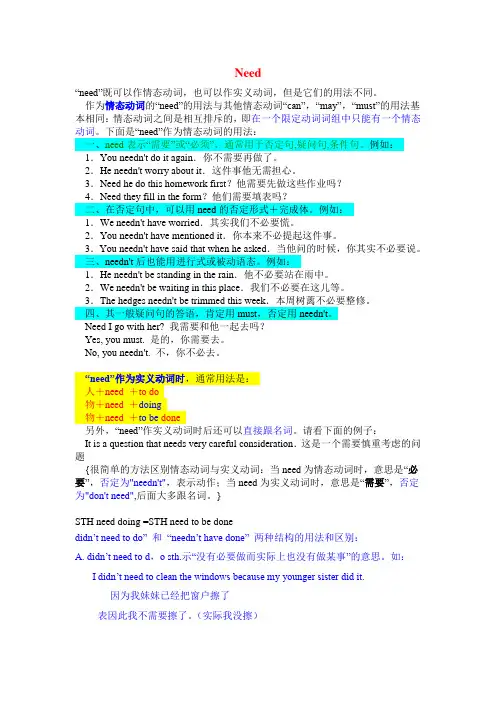
Need“need”既可以作情态动词,也可以作实义动词,但是它们的用法不同。
作为情态动词的“need”的用法与其他情态动词“can”,“may”,“must”的用法基本相同:情态动词之间是相互排斥的,即在一个限定动词词组中只能有一个情态动词。
下面是“need”作为情态动词的用法:一、need表示“需要”或“必须”,通常用于否定句,疑问句,条件句。
例如:1.You needn't do it again.你不需要再做了。
2.He needn't worry about it.这件事他无需担心。
3.Need he do this homework first?他需要先做这些作业吗?4.Need they fill in the form?他们需要填表吗?二、在否定句中,可以用need的否定形式+完成体。
例如:1.We needn't have worried.其实我们不必要慌。
2.You needn't have mentioned it.你本来不必提起这件事。
3.You needn't have said that when he asked.当他问的时候,你其实不必要说。
三、needn't后也能用进行式或被动语态。
例如:1.He needn't be standing in the rain.他不必要站在雨中。
2.We needn't be waiting in this place.我们不必要在这儿等。
3.The hedges needn't be trimmed this week.本周树蓠不必要整修。
四、其一般疑问句的答语,肯定用must,否定用needn't。
Need I go with her? 我需要和他一起去吗?Yes, you must. 是的,你需要去。
No, you needn't. 不,你不必去。
情态动词情态动词有can (could), may (might), must, have to, shall (should, will (would), dare (dared), need (needed), ought to等。
情态动词无人称和数的变化;不能单独使用,必须与其后的动词原形构成谓语。
一、can, could1) 表示能力(体力、知识、技能)。
如:Can you lift this heavy box? (体力)Mary can speak three languages.(知识)Can you skate?(技能)此时可用be able to代替。
Can只有一般现在式和一般过去式;而be able to则有更多的时态。
如:I’ll not be able to come this afternoon.当表示“经过努力才得以做成功某事”时应用be able to,不能用Can。
如:He was able to go to the party yesterday evening in spite of the heavy rain.2) 表示请求和允许。
-----Can I go now?----- Yes, you can. / No, you can’t.此时可与may互换。
在疑问句中还可用could, might代替,不是过去式,只是语气更委婉,不能用于肯定句和答语中。
---- Could I come to see you tomorrow?---- Yes, you can. ( No, I’m afraid not. )3) 表示客观可能性(客观原因形成的能力)。
They’ve changed the ti metable, so we can go by bus instead.This hall can hold 500 people at least.4) 表示推测(惊讶、怀疑、不相信的态度),用于疑问句、否定句和感叹句中。
实义动词是具有实际词义的动词,用来单独作谓语。
情态动词具有一定的词义,但不能单独作谓语,只用于构成复合谓语,增加谓语的情态、语气等色彩。
如We must obey traffic regulations.我们必须遵守交通规则。
在这个句子中,obey 有实际的词汇意义,在句子中作谓语,它是实义动词。
must 有它的词义“必须”,但它不在句子中作谓语,只是帮助增加了句子中说话人的态度。
我们用dare这个单词来作说明dare的用法1) dare用作实义动词,此时其后的动词不定式可带to也可不带to,且dare有人称和数以及时态的变化。
例如: I dare to jump down from the top of the wall. 我敢从那墙头上跳下来。
She doesn't dare (to) meet her teacher's eyes. 她不敢与老师对视。
2) dare用作情态动词,后跟动词原形,主要用于疑问句、否定句和条件句中。
例如: How dare she do things like that to me? 她怎么敢对我做那种事? -Dare you catch the mouse? 你敢去抓那只老鼠吗? -I daren't do that. 我不敢抓。
If you dare say that to our teacher, I would vote for you. 如果你敢向我们的老师说那件事,我就投你一票。
dare的用法dare do sth: 且“dare”没有任何词形变化,情态动词dare to do sth: 且“dare”有词形变化,实义动词情态动词dare一般只用在疑问句或否定句,(情态动词dare不要用在陈述语气里) “敢或者有勇气”之意。
例 how dare you speak to me like that ..... (dare不跟to 用,跟动词例如speak)及物动词dare表示挑战,挑衅,尝试,例如 dare somebody to do sth (跟to 用)及物动词dare例如, He dared to do sth, 他敢于做, 上面的dare sb to do sth 是挑战别人做某事.不及物动词dare表示有足够的胆量勇气,后不加to或者名词或动词,例如 you wouldn't dare。
高三英语高考语法专题复习情态动词need、dare、ought to考点总结与练习高三英语教研组整理热身练习(2024版):1.--_______ we clean the classroom immediately?--No, you ______. You ______ clean it after school.A. Must; needn't; canB. Need; mustn't; mayC. Must; mustn't; canD. Shall; can't; may2.It's cold today. You need your coat.A. to wearB. wearC. wearsD. wore3. I wonder how he ___ that to the teacher.A.dare to sayB.dare sayingC.not dare sayD.dared say参考答案与解析:1.答案:A本题主要考查情态动词的用法。
句意:--我们必须立即打扫教室吗?--不,不必。
你可以放学后打扫它。
表“必须”,用must,故排除B/D。
用must 提问时,肯定回答用must,否定回答用needn't/ don't have to, 由No可知此处为否定回答,故排除C,选A。
2.答案:Aneed作实义动词时,后接不定式作宾语,need to do sth. 需要做某事,故选A。
3. 答案:Ddare既可作实义动词,也可做情态动词。
1)作实义动词时,其后既可接to,也可不接to.2) 做情态动词,后不接to,直接接动词原形A.dare to say 有to,这时dare是实义动词,因为主语是he,那么应该有人称或时态的变化,但是dare是原形,所以排除。
B. dare saying, dare后面不管加不加to都跟动词原形,所以排除。
高考英语之情态动词用法和虚拟语气知识点和范例一、can和could1、can的用法(1)表示体力和脑力方面的能力。
(2)表示对现在的动作或状态进行主观的猜测,主要用在否定句和疑问句中。
(3)表示可能性,理论上的可能性,意为“有时候可能会”,可用于肯定句。
(4)表示允许,意思与may接近。
(5)表示说话人的推测、怀疑、惊异、猜测或不肯定等,主要用于否定句、疑问句或感叹句中。
(6)can的特殊句型cannot…too / enough表示“无论怎么。
也不过分”。
“越……越好”。
cannot but+ do sth.表示“不得不,只好”。
2、could的用法(1)表示能力,指的是过去时间。
(2)表示允许,指的是过去时间。
(3)表示可能,可以指过去时间,也可以指现在时间,表示语气缓和。
(4)委婉客气地提出问题或陈述看法,指的是现在时间。
主要用于疑问句,回答时用can。
3、can与could的区别can表推测时只用于否定句和疑问句(could无此限制)。
couldn't的可能性比can't小。
4、can与be able to的区别(1)现在时:无区别,但后者不常用。
(2)完成时;can没有完成时,此时要用have(has,had)been able to。
(3)将来时:can没有将来时,要用will be able to。
(4)过去时:could表示一般能力,was/were able to 表示在具体场合通过努力成功做成某事的能力。
二、may 和might1、may的用法(1)表示询问或说明一件事可不可以做。
(2)表示一件事或许会发生或某种情况可能会存在,通常用在肯定句和否定句中。
注意:表示可能性时,can't语气强,表示“不可能”,may not 语气弱,表示“可能不”。
2、might的用法(1)表示询问或允许,指的是过去时间。
(2)表示可能发生的事,可以指过去时间,也可以指现在时间,语气更加不肯定,可能性比may小一些。
dare用法浅议作者:何振宗来源:《中学教学参考·下旬》 2017年第1期dare 属于比较活跃的词汇,在中学英语中频频出现,人教版九年级 Unit Four 有专练,其用法比较复杂且难以区分。
dare 完全可以用作实意动词,后跟带 to的不定式,构成 dareto do sth. 这时的 dare 就有第三人称单数dares,现在分词daring,过去式及过去分词dared。
它在一定条件下可以用作情态动词,后跟省略 to 的不定式,构成 dare do sth.dare 作为情态动词时主要用于疑问句、否定句和条件从句中,不用于肯定句,只有一个例外:I dare say. 它是个固定说法,意思是:“我想/很可能/大概/我相信。
” 现分述如下。
一、dare作实意动词,意思是:敢;敢做;激(某人做某事);问(某人)有无胆量(做某事);敢于;大胆;无畏。
通常与一般动词一样构成否定和疑问式,最常见于否定句中。
例1. Since he was stuck in a lift a year ago he hasn’t dared to get back into one.自从一年前被困在电梯之后,他就再也没敢乘过电梯。
例2. I dare to swim across the river. 我敢游过河。
例3. I don’t dare to say that. 我不敢说那事。
例4. Do you dare to go with me?你敢跟我一起去吗?(肯定回答:Yes,I do. 否定回答:No,I don’t.)例5. I won’t dare to break my promise. 我不敢食言。
例6. You told him! How did you dare?你已告诉他了!你竟敢?例7. I hardly dared to hope she’d remember me. 我几乎不敢指望她会记得我。
dare的两种用法Dare的意思是“有勇气做某事”,它也有两种用法:dare 作实义动词* as an ordinary verb followed by an infinitive with to, with s in the third person singular and with questions and negatives formed with do:作为实义动词时,接带to的不定式,第三人称单数作主语时加s,疑问句和否定句用do来构成:He never dares to criticise her for wasting money and she doesn't dare to interrupt him when he's working.他从不敢批评她浪费钱,而她不敢打扰他工作。
dare 作情态动词作为情态助动词时,接不带to的不定式,第三人称单数作主语时不加s,疑问句和否定句不需要用do来构成:Dare she tell him what she thinks about him? She daren't say anything. He will only shout at her. "How dare you speak to me like that?" he will say.她敢告诉他她对他的想法吗?她什么也不敢说。
他只会对着她咆哮:“你怎敢那样对我说话?”他肯定会这么说。
比较Differences in use are not as fixed or clear cut between doesn't dare to and daren't as they are between doesn't need to and needn't, except in expressions or collocations such as:doesn't dare to与daren't在用法上的差别不像doesn't need to和needn't那么固定或清晰,除了在以下这些表达和搭配中:* How dare you?你怎么敢?eg: How dare you walk away when I'm talking to you?我在跟你说话的时候你怎么敢走开?* I dare you to…我谅你不敢……I dare you to go up to him and ask him for a date.我谅你也不敢走到他面前请他跟你约会。
* I dare say…我敢说……I dare say you're pretty hungry after all that cycling.我敢说你骑了那么久后肯定饿死了。
In this last example, I dare say means I suppose.最后一例中的I dare say的意思是I suppose,我料想。
情态动词如何表猜测情态动词用于肯定猜测1. must用于肯定句,表示较有把握的推测,意为“准是,一定”。
后面接动词原形,表示对现在的推测。
如:-I've had no sleep for 48 hours. 我已经48小时没睡觉了。
-You must be very tired. 你一定很累了。
2. should用于肯定句中,语气次之,意为“很可能,应该”,指按常理推测。
如:They left yesterday. They should be home by now. 他们昨天就离开了,现在该到家了。
3. can用在肯定句中,表示理论上的可能性。
如:Smoking can cause cancer. 吸烟有可能引起癌症。
4. may用在肯定句中,表示对现在把握不大的推测,意为“也许,可能”。
如:Don't play with the knife. You may cut yourself. 不要玩小刀,你可能会伤了自己。
5. could, might也可表示推测意义,常用在过去时态中;但在某些场合下,为了使语气更缓和、更委婉,常用could, might代替can, may。
如:They saw something in the sky last night. It could/might be a UFO. 昨天晚上他们看见天空中有个东西。
它有可能是不明飞行物。
You may/might/could be very tired. 你可能很累吧!情态动词用于否定猜测1. 表示否定的推测时,can't/couldn't语气最强,指“不可能”,带有惊异、怀疑的感情色彩。
如:The story sounds reasonable, but it can't be true. 这个故事听起来合情合理,但不可能是真的。
2. 语气不很肯定时,常用may not或might not表否定推测,意为“可能不,也许不”。
如:He may not/might not be at home. 他可能不在家。
情态动词用于疑问句表猜测疑问句中的推测,常用can或could,意为“可能”。
如:Who can it be? Can it be Jenny? 那会是谁呢?是珍妮吗?The money has disappeared! Who could have taken it? 钱不见了!会是谁拿去的呢?Oh, how could you be so stupid? 哦,你怎么会这么愚蠢呢can have done用法小结can have done 通常只用于否定句和疑问句。
用于否定句时表否定推断,推测肯定没做;用于疑问句时意为“难道真的做了吗”,表示怀疑。
例如:Can he have done such a foolis h thing? (= Is it possible …?)他会做这样的傻事吗?(表怀疑)He can't have taken it home.他不可能把它带回家了。
(表不可能)could have donecould have done 可用于肯定句、疑问句和否定句。
用于肯定句既可以表示过去能够做而实际未做,有惋惜、遗憾或委婉批评之意,也可以表示对过去动作的推测;用于否定句和疑问句的情况与can have done相同。
例如:You could have done better, but you didn't try your best.你本可以做得更好,但是你没有尽力而为。
(表惋惜)This glass is cracked. Someone could have dropped it.这个玻璃杯破了。
可能是谁把它掉在地上了。
(表推测过去)Could he have left the work unfinished?他会丢下工作不干了?(表怀疑)He couldn't have checked out so early.他不可能这么早就离开了。
(表不可能)注意:can't have done 的语气比couldn't have done 要强一些。
例如:He can't have been to that town.他根本不可能去过那座城市。
(语气略强)The measurement couldn't have been wrong.测量不可能出错了吧。
(语气稍弱)may have done用法小结may/might have done 推测过去“may/mig ht+动词的完成式”表示对过去发生的行为的推测。
例如:-Whatever has happened to George?-乔治发生了什么事?-I don't know. He may have got lost.-我不知道,他可能迷路了。
You might have read about it in the papers.你可能在报上已经看过这个消息了。
(之前我们做过can have done用法小结,can have done表推测时都是对过去进行推测,但是may have done不仅可以推测过去)may/might have done 推测现在“may/might+动词的完成式”表示对现在情况的推测。
例如:She might have got up now.现在她可能已经起床了。
may/might have done 预测未来“may/might+动词的完成式”表示推测将来某时之前的情况。
例如:He may have left when you get there.等你到达的时候他可能已经离开了。
注意:may have done 和might have done 表推测时,might 所表示的可能性比may 小,语气较委婉:How quickly time passed! It might have happened yesterday.时间过得好快啊!这事好像就发生在昨天。
He might have seen the surprise in my face.他或许已经看到了我惊异的表情。
might have done 表轻微责备might have done 除了能够表推测,还能表示过去本来可以做而实际并没有做。
这时带有轻微的责备之意。
例如:The proposal might have been refused.这个建议本该拒绝的。
(有轻微的责备之意)I might have taken another path.我本可以走另一条路。
may not/mightn't have done 表“可能不”之前我们讲到过can't/couldn't have done 是表示“不可能”,而may not/mightn't have done 则是表示“可能不”,要注意区分哦:He can't have been at the meeting, he's on a business trip this week.他不可能有出席会议,他这周出公差。
We couldn't have done it without you.没有你我们肯定完成不了。
They may not have known it beforehand.他们事先可能不知道这事儿。
They mightn't have regarded me as their friend.他们可能没有把我当作朋友看待。